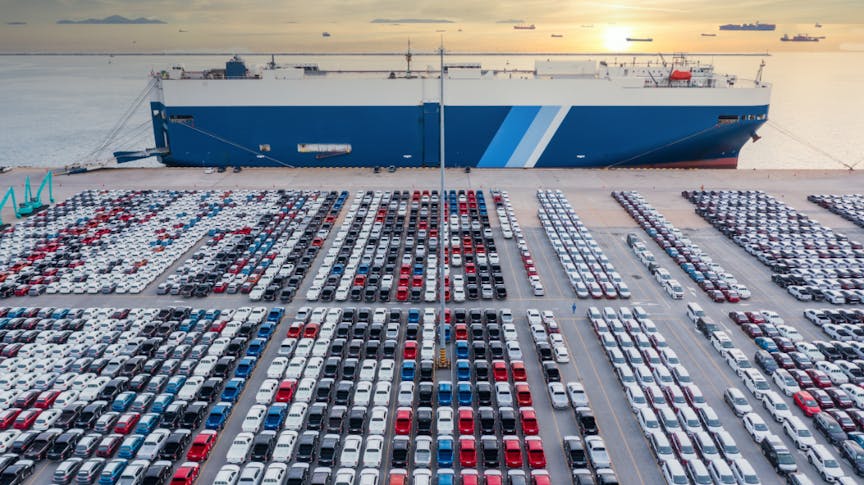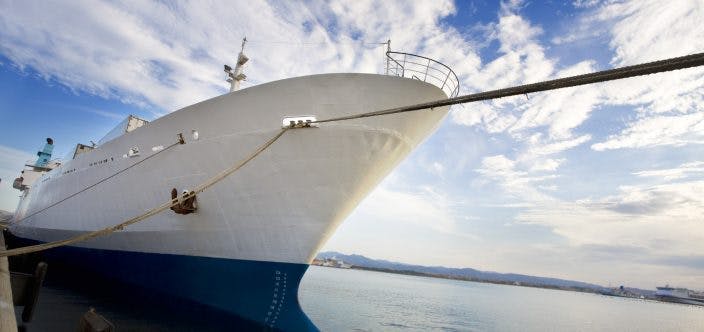Electric Vehicle Fires on RoRo/RoPax Vessels
There are divided opinions and much uncertainty surrounding the transportation of alternatively fuelled vehicles at sea. With a growing market for electric vehicles (EV’s) it will be hard to avoid carrying them, and therefore the best thing we can do is educate ourselves on the risks so that we can control and minimise them. This article aims to present unbiased information based on a growing body of evidence provided by reputable research institutions and projects that are leading the way in their understanding of EV battery fires and the associated challenges of carrying them onboard RoRo/RoPax vessels.

Research Institute of Sweden (RISE)
RISE is a non-profit research institute with a dedicated department for fire and safety. They have testing facilities in both Sweden and Norway and have been burning cars for research purposes since the 1950’s. RISE have led a number of projects to increase knowledge in battery and EV fire safety, including BREND (manual fire extinguishing of gas and electric vehicles in RoRo spaces), E-TOX (toxic gasses from fires in electrical vehicles), ACEA (Electrical Vehicle Fire Safety in Enclosed Spaces), and LASH FIRE which we will expand on below.
Link to RISE database of publications/project papers >>
LASH FIRE:
What is it?
LASH FIRE stands for Legislative Assessment for Safety Hazards of Fire and Innovations in Ro-Ro Ship Environment.
We rely on having multiple safety barriers in place to maintain safe operations, but fire safety regulations for RoRo ships are struggling to keep up with the realities of today’s maritime business. In acknowledgement of this the European Commission provided 13.5 million euros worth of funding for the 4-year LASH FIRE project, which worked toward developing fire safety solutions and reducing the risk of fires onboard RoRo ships.
The project consortium consisted of 27 research and industry partners from 13 EU member states, and it is the first time that marine insurers, both IUMI and Cefor, have been invited to be an active and important stakeholder in a project of this type and magnitude.
The LASH FIRE project will provide the basis for the revision of IMO regulations and a dissemination paper is currently being complied (the project recently came to a close in September 2023). Everything is publicly available on the webpage, so please follow the link below to read more in-depth about the results of this project and to watch some well-presented educational videos!
What were the main findings?
- EV fires are not more common/more likely than conventional vehicle fires.
- The intensity of an EV fire is not necessarily more than that of a conventional car fire because most of the fire load comes from the materials used in the construction of the vehicle (plastics, interior etc) so the fire intensity is similar.
- The fire growth rate of an EV fire is not faster than that of a conventional car fire.
- Battery car fires can be controlled and extinguished by drencher systems among other methods.
- It is highly unlikely that you will experience an electric shock from fighting a battery fire with water.
- The re-ignition risk with an EV is higher than that of a conventional vehicle and the vehicle must be closely monitored after the fire has been extinguished. Infrared cameras and vehicle fire blankets are recommended.
- Early fire detection and quick use of the fixed firefighting system are crucial.
- Fire suits need to be EN 469:2020 class 2, and specific post fire procedures are needed due to toxicity/chemical exposure risks.
Click here to read more about the LASH FIRE results >>
ELBAS
What is it?
The Danish institute of fire technology (DBI) ran a project on electric vehicle fires at sea abbreviated and known as “ELBAS”. It was funded by the Danish Maritime Fund and the main contributors to the project were DFDS and Stena. The project purpose was to examine the current practices of fighting EV battery fires onboard and search for more effective methods to develop holistic fire safety strategies. The solutions proposed aim to be implementable and affordable, and additionally the project has worked to increase awareness of the complexity of EV battery fires.
You can find the final report and read more in-depth information by following the link below to their webpage.
What were the main findings?
- All of the fires in the ELBAS tests could be extinguished safely.
- The right equipment and training of crew is a critical aspect for lowering EV fire risks.
- With the right fire strategy, EV’s do not necessarily pose an increased safety problem in ferry traffic.
- For portable firefighting tools to have any effect on the fire, their operation must be included when developing vehicle stowage procedures for loading the vessel.
- ELBAS confirmed the effectiveness of drencher systems and boundary cooling.
- To avoid harmful chemical exposure there is an increased need for the correct protective gear and strict procedures post fire.
In their executive summary, DBI finished on a positive note:
“In conclusion, the issue of EV fire safety onboard ships should not be a barrier to meeting the increasing market demand and support the green transition. The overall conclusion of the ELBAS project is that EV fires on ferries are not to be feared more than any other fire at sea. They can typically be dealt with using the correct technology, education, and training of shipboard personnel, as well as with coordinated cooperation between the ship and with emergency services on land.”
(Quoted from DBI Executive Summary page iii.)
Click here to read more about ELBAS >>
IUMI Guidelines
In response to growing concerns surrounding the transportation of EV’s by sea, the International Union of Marine Insurance published best practice and recommendations for the safe carriage of electric vehicles in September 2023.
Link to the full IUMI position paper >>
Alandia’s EV fires podcast with Lena Brandt
Alandia has recorded a podcast with Lena Brandt, who has participated in both the LASH FIRE and ELBAS projects, to hear more about the risks of EV fires and bust some common myths. Click the link to listen!


